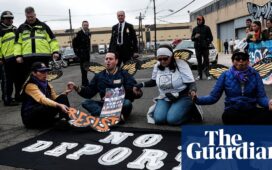The New Mexico governor’s office paid about $4,000 for a bus to transport 55 Central American asylum seekers to Denver early Sunday morning in an arrangement negotiated between nonprofits in both communities, a spokeswoman confirmed on Tuesday.
The office of Gov. Michelle Lujan Grisham coordinated with Annunciation House, a nonprofit that works with migrants along the El Paso, Texas/Juarez, Mexico border, to send the asylum seekers to Denver because their shelters were over capacity. It was the first time Annunciation House had sent migrants to another state.
The shelters in Las Cruces, N.M., have been inundated with migrants and asylum seekers since April 12, New Mexico governor’s spokeswoman Claudia Tristán said.
Because the shelters had reached capacity, border patrol agents were releasing asylum seekers to bus stations, giving them no way to contact their sponsors. The asylum seekers are individuals who, through sponsors, have applied for legal status in the United States to seek refuge from persecution and are waiting on a court to make a determination on their claims.
Lujan Grisham’s office decided to get involved for the community’s sake — residents didn’t ask for people to be released on the street, but because of the proximity to the border, that was what was happening, Tristán said. She added that ICE agents were doing the same thing in El Paso, Texas, which is about an hour from Las Cruces.
The New Mexico governor did not provide advance notice to Colorado’s governor about the arrangements, but Gov. Jared Polis’ office said Monday he supports providing humanitarian assistance to asylum seekers.
Lujan Grisham’s office spoke to Polis’ office after the asylum seekers’ arrival, Tristán said, but Polis’ office declined Tuesday to comment on the discussions or logistics.
The Department of Homeland Security said border patrol agents and ICE agents began releasing “non-criminal, processed family units” on March 19 and since then had released more than 40,000 people with notices to appear in court.
“Whenever possible, the releases have been coordinated with local non-governmental organizations (NGOs),” according to a DHS statement. “As NGOs have reached their capacities, CBP has released family units at transportation hubs during daylight hours when the weather does not endanger those released.”
The agency said its agents have exceeded their capacity to apprehend people and to “expeditiously process, transfer to ICE or direct release.”
“To address this critical operational challenge, and ensure the safety of individuals in our custody, CBP will begin daily transportation of unprocessed family units across southern border sectors to leverage available capacity for processing and holding,” according to the statement.
Annunciation House, based in El Paso, has a network of nonprofits, including in Denver and Dallas, Texas. So, agency officials reached out to nonprofits in both cities to see if they could assist.
When three Denver-area churches offered up their spaces for shelter, Lujan Grisham’s office agreed to pay for transportation in one-time deal. The asylum seekers, most of whom are from Guatemala, Honduras and El Salvador, arrived at about 2 a.m. Monday after a nine-hour drive. The last two people are scheduled to leave to their sponsor’s destinations by Wednesday morning, said Jennifer Piper, interfaith organizing director for American Friends Service Committee in Denver, said in a Tuesday news release.
In the future, the New Mexico governor’s office will limit its assistance to logistics, Tristán said. The office also plans to continue communicating with border patrol agents to ensure asylum seekers are connected to the resources they need.
“Regardless, we want people at our shelters rather out on streets, not knowing what’s going on,” Tristán said.
Lujan Grisham’s office is encouraging people to make donations out to the Santa Fe Community Foundation to help with future transportation costs of refugees.
The nonprofits in Denver working with Annunciation House decided to temporarily take in the asylum seekers and reconvene on Wednesday to determine whether they would regularly offer the same assistance in the future.









